BY: JANET STEINBERG
The keys to my heart are not made of
silver or gold. The Keys to my heart are a 125-mile chain of
laid-back islands in Florida that extends from Mile Marker 0 in Key West, to
Mile Marker 126 in Key Largo. The 42 bridges that connect The Keys span the
Atlantic Ocean, Florida Bay, and the Gulf of Mexico.
silver or gold. The Keys to my heart are a 125-mile chain of
laid-back islands in Florida that extends from Mile Marker 0 in Key West, to
Mile Marker 126 in Key Largo. The 42 bridges that connect The Keys span the
Atlantic Ocean, Florida Bay, and the Gulf of Mexico.
The most well known
bridge on this Overseas Highway is the 1980’s Seven Mile Bridge, one of the
longest segmental bridges in the world. It replaced Henry Flagler’s1912 Over-Sea Railroad Bridge,
a turn-of-the-century technological marvel that was badly damaged by the Labor Day
Hurricane of 1935.
bridge on this Overseas Highway is the 1980’s Seven Mile Bridge, one of the
longest segmental bridges in the world. It replaced Henry Flagler’s1912 Over-Sea Railroad Bridge,
a turn-of-the-century technological marvel that was badly damaged by the Labor Day
Hurricane of 1935.
Come
along with me as I visit the nooks and crannies of three of Florida’s
well-known Keys: Marathon, Islamorada, and Key Largo.
along with me as I visit the nooks and crannies of three of Florida’s
well-known Keys: Marathon, Islamorada, and Key Largo.
MARATHON
KEY: Settlements on the islands of
Marathon can be traced back to the early 1800s, when Bahamians established
tropical fruit farms and New England fishermen inhabited the region.
KEY: Settlements on the islands of
Marathon can be traced back to the early 1800s, when Bahamians established
tropical fruit farms and New England fishermen inhabited the region.
Marathon Key got its
name from workers constructing the monumental Over-Sea Railroad from mainland
Florida throughout the Keys in the early 1900s. Working night and day to meet
the grueling construction schedule, crews reputedly said, “This is getting
to be a real Marathon.”
name from workers constructing the monumental Over-Sea Railroad from mainland
Florida throughout the Keys in the early 1900s. Working night and day to meet
the grueling construction schedule, crews reputedly said, “This is getting
to be a real Marathon.”
I recently developed a
fondness for turtles. Not the small
chocolate covered ones with caramel bellies covered in pecans, but the
humongous ones with flippers and hard shells.
fondness for turtles. Not the small
chocolate covered ones with caramel bellies covered in pecans, but the
humongous ones with flippers and hard shells.
My new-found
fascination with turtles began after I visited Marathon Key’s Turtle Hospital,
the only state-licensed veterinary hospital in the world that is dedicated
solely to treating sea turtles. Rescue…rehab…release. That is the motto of this volunteer-staffed
hospital.
fascination with turtles began after I visited Marathon Key’s Turtle Hospital,
the only state-licensed veterinary hospital in the world that is dedicated
solely to treating sea turtles. Rescue…rehab…release. That is the motto of this volunteer-staffed
hospital.
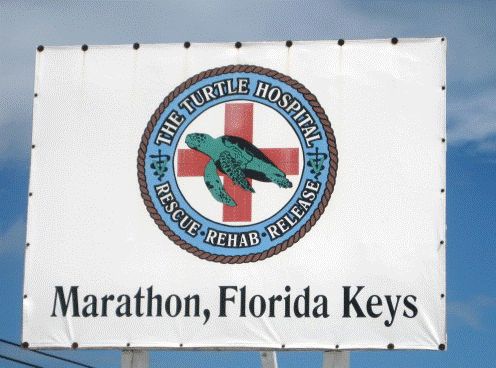 |
| RESCUE…REHAB…RELEASE |
The Turtle Hospital has two
ambulances that transport sea turtles during rescues and releases. The rehab center is built around a large
saltwater pool with many individual tanks and a pumping and filtration system
to isolate diseased sea turtles.
ambulances that transport sea turtles during rescues and releases. The rehab center is built around a large
saltwater pool with many individual tanks and a pumping and filtration system
to isolate diseased sea turtles.
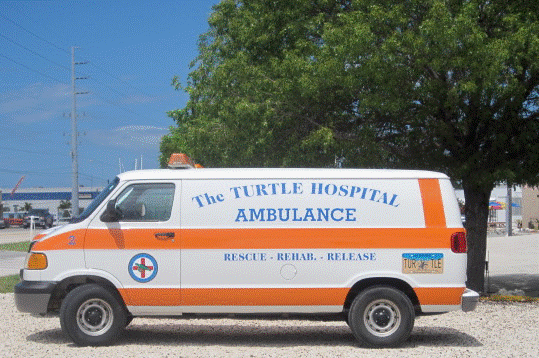 |
| TURTLE HOSPITAL AMBULANCE |
The hospital treats a variety of
ailments such as flipper amputations caused by entanglements; shell damage
caused by boat collisions; and intestinal impactions caused from ingestion of
foreign objects. In an average year, the
hospital receives as many as 70 injured sea turtles. To date, it has released more than 1000 sea
turtles back to their natural environment.
ailments such as flipper amputations caused by entanglements; shell damage
caused by boat collisions; and intestinal impactions caused from ingestion of
foreign objects. In an average year, the
hospital receives as many as 70 injured sea turtles. To date, it has released more than 1000 sea
turtles back to their natural environment.
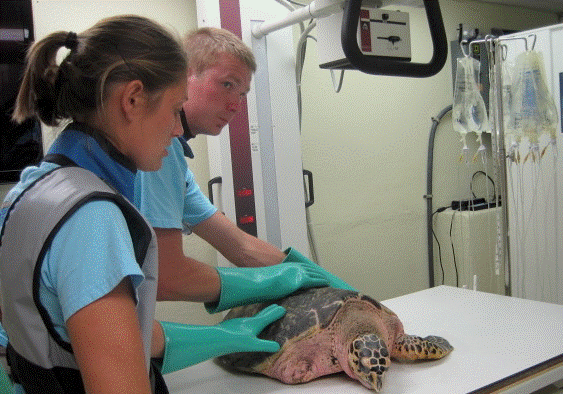 |
|
RANDY RUDY, AN AMPUTEE
HAWKSBILL TURTLE |
From a visitor center at the west
end of Marathon, you can take a ferry to Pigeon Key, a tiny island that once
housed the workers who built Henry Flagler’s historic Over-Sea Railroad in the
early 1900s. While the rest of the Keys have evolved with the years, Pigeon Key
has remained essentially unchanged and is now a national historic treasure
complete with a museum chronicling the railroad’s construction.
end of Marathon, you can take a ferry to Pigeon Key, a tiny island that once
housed the workers who built Henry Flagler’s historic Over-Sea Railroad in the
early 1900s. While the rest of the Keys have evolved with the years, Pigeon Key
has remained essentially unchanged and is now a national historic treasure
complete with a museum chronicling the railroad’s construction.
For fresh-off-the-boat
seafood, you can’t beat the thatched roofed Keys Fisheries located directly on
Florida Bay. It was there that I was
introduced to a tasty spear-caught fish named Hogfish. Evenings offer a special Marathon Key
dessert,,,a sun-sational sunset.
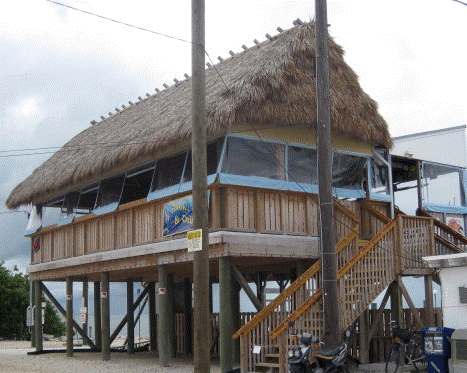 |
| KEYS FISHERIES |
ISLAMORADA: Welcome to Fin
Land, the Florida Key known as the Sport-Fishing Capital of the World.
Islamorada is heralded for its angling diversity and features the Keys’ largest
fleet of offshore charter and shallow-water “backcountry” boats. It is where backcountry sport fishing and
saltwater fly-fishing were pioneered.
Land, the Florida Key known as the Sport-Fishing Capital of the World.
Islamorada is heralded for its angling diversity and features the Keys’ largest
fleet of offshore charter and shallow-water “backcountry” boats. It is where backcountry sport fishing and
saltwater fly-fishing were pioneered.
However, if you don’t care to fish,
how about feeding a bucket of raw fish to the giant tarpons at Robbie’s of
Islamorada? Schools of 50 to 100 tarpon swim to
Robbie’s daily to catch the baitfish thrown to them by giddy tourists with blue
plastic, fish-filled bucket. Resident pelicans compete with the
“Silver Kings” for the small baitfish.
how about feeding a bucket of raw fish to the giant tarpons at Robbie’s of
Islamorada? Schools of 50 to 100 tarpon swim to
Robbie’s daily to catch the baitfish thrown to them by giddy tourists with blue
plastic, fish-filled bucket. Resident pelicans compete with the
“Silver Kings” for the small baitfish.
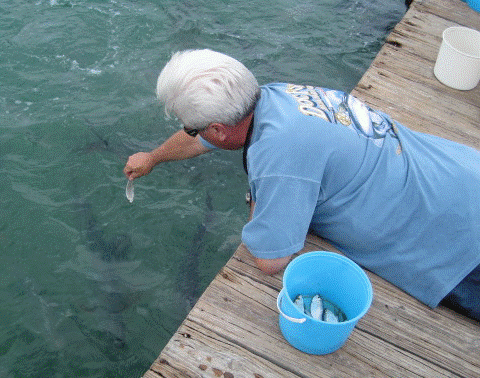 |
|
TARPON |
This fisherman’s paradise was
incorporated as a municipality in January 1998. Now called Islamorada, Village
of Islands, the village that measures 20 miles long and, in some places, barely
150 feet wide encompasses Plantation, Windley, Upper and Lower Matecumbe Keys.
incorporated as a municipality in January 1998. Now called Islamorada, Village
of Islands, the village that measures 20 miles long and, in some places, barely
150 feet wide encompasses Plantation, Windley, Upper and Lower Matecumbe Keys.
Legend has it the area
was named by Spanish explorers who, seeing the purple sky at sunset and the
purple bougainvillea, used the words “isla”, the word for island, and “morado”
the Spanish word for purple. Thus,
purple island.
was named by Spanish explorers who, seeing the purple sky at sunset and the
purple bougainvillea, used the words “isla”, the word for island, and “morado”
the Spanish word for purple. Thus,
purple island.
Numerous high-profile
figures, including past U.S. presidents and British royalty, have visited
Islamorada to take part in the world’s best sport fishing and to compete in
acclaimed fund-raising fishing tournaments.
A trip to Islamorada would not be
complete without sampling some of the local island cuisine headlined by
succulent fresh seafood served everywhere from island tiki bars and
dockside fish houses to gourmet beachfront cafes and secluded island bistros.
complete without sampling some of the local island cuisine headlined by
succulent fresh seafood served everywhere from island tiki bars and
dockside fish houses to gourmet beachfront cafes and secluded island bistros.
 |
| TIKI BAR AT POSTCARD INN AT HOLIDAY ISLE |
Chef Michael’s is one of
Islamorada’s best restaurants in which to eat fresh fish. Their fish deliveries go through a rigorous
testing protocol before being served at the restaurant. Chef Michael’s knows just where, and by what
method, the fish was caught. They
usually even know the name of the fishing boat captain.
Islamorada’s best restaurants in which to eat fresh fish. Their fish deliveries go through a rigorous
testing protocol before being served at the restaurant. Chef Michael’s knows just where, and by what
method, the fish was caught. They
usually even know the name of the fishing boat captain.
Sunday brunch is a
culinary happening at Chef Michael’s.
“Sake to me Mary” is a unique eye-opener, and Challah Brulee is a
creamy, caramelized French toast made with challah bread. Then go a few shorts steps from Chef
Michael’s to Ma’s Fish Camp, “the new local joint”, for the best homemade Key
Lime Pie you ever tasted.
culinary happening at Chef Michael’s.
“Sake to me Mary” is a unique eye-opener, and Challah Brulee is a
creamy, caramelized French toast made with challah bread. Then go a few shorts steps from Chef
Michael’s to Ma’s Fish Camp, “the new local joint”, for the best homemade Key
Lime Pie you ever tasted.
Postcard Inn Beach
Resort and Marina at Holiday Isle is an oceanfront resort that offers the
retro, throwback feel of a nostalgic American beach vacation. Each room, with its waterfront style of white
woods and sand–colored stripes, has been personalized with hand-stenciled
sayings on the wall. My wall read:
“Life’s an ocean, sail it!”
Resort and Marina at Holiday Isle is an oceanfront resort that offers the
retro, throwback feel of a nostalgic American beach vacation. Each room, with its waterfront style of white
woods and sand–colored stripes, has been personalized with hand-stenciled
sayings on the wall. My wall read:
“Life’s an ocean, sail it!”
KEY
LARGO: The Keys’ longest island gained fame
when the 1947 movie classic “Key Largo,” featuring Humphrey Bogart
and Lauren Bacall, hit the silver screen. The Caribbean Club, a local waterfront saloon, is the only
Florida Keys location where filming of the movie “Key Largo” took
place; all other scenes were filmed on a Hollywood sound stage. Walls within
the bar are decorated with memorabilia from the movie.
LARGO: The Keys’ longest island gained fame
when the 1947 movie classic “Key Largo,” featuring Humphrey Bogart
and Lauren Bacall, hit the silver screen. The Caribbean Club, a local waterfront saloon, is the only
Florida Keys location where filming of the movie “Key Largo” took
place; all other scenes were filmed on a Hollywood sound stage. Walls within
the bar are decorated with memorabilia from the movie.
 |
| THE ICONIC BOGIE AS CAPTAIN CHARLIE ALLNUTT |
However, Bogie’s presence is still
apparent in Key Largo. The steam-powered African Queen, the actual boat he
skippered in his epic 1951 film “The African Queen,” is on view at
the Holiday Inn Key Largo resort and marina.
apparent in Key Largo. The steam-powered African Queen, the actual boat he
skippered in his epic 1951 film “The African Queen,” is on view at
the Holiday Inn Key Largo resort and marina.
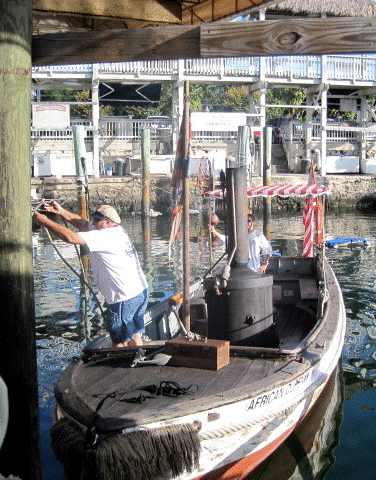 |
|
THE RESTORED AFRICAN QUEEN
|
As Charlie Allnutt, the gin swilling
captain of The African Queen, Bogie and Director John Huston were the only ones
that escaped dysentery while filming the movie in the Belgian Congo. Bogie’s explanation was as follows: “All I
ate was baked beans, canned asparagus and scotch whiskey. Whenever a fly bit Huston or me, it dropped dead.”
captain of The African Queen, Bogie and Director John Huston were the only ones
that escaped dysentery while filming the movie in the Belgian Congo. Bogie’s explanation was as follows: “All I
ate was baked beans, canned asparagus and scotch whiskey. Whenever a fly bit Huston or me, it dropped dead.”
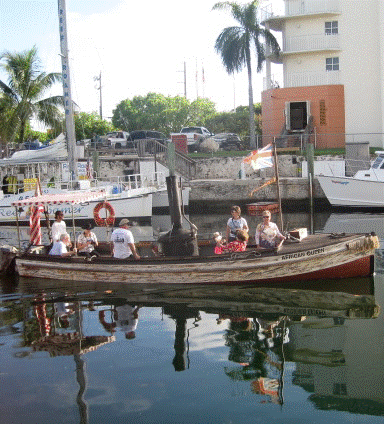 |
| TAKE A RIDE ON THE AFRICAN QUEEN |
Key Largo, about a 60-minute drive from Miami International Airport, is often
called the Dive Capital of the World. A leading site for experienced divers is
Spiegel Grove, a retired U.S. Navy ship that is one of the largest
vessels in the world ever purposely scuttled to create an artificial reef.
called the Dive Capital of the World. A leading site for experienced divers is
Spiegel Grove, a retired U.S. Navy ship that is one of the largest
vessels in the world ever purposely scuttled to create an artificial reef.
Be it diving, fishing, or imbibing
you seek, I guarantee you’ll fall for the Florida Keys …hook, line, and
drinker.
you seek, I guarantee you’ll fall for the Florida Keys …hook, line, and
drinker.
JANET STEINBERG is the winner of 38 national Travel Writer
Awards and an International Travel Consultant with The Travel
Authority in Mariemont, Ohio.
Awards and an International Travel Consultant with The Travel
Authority in Mariemont, Ohio.
